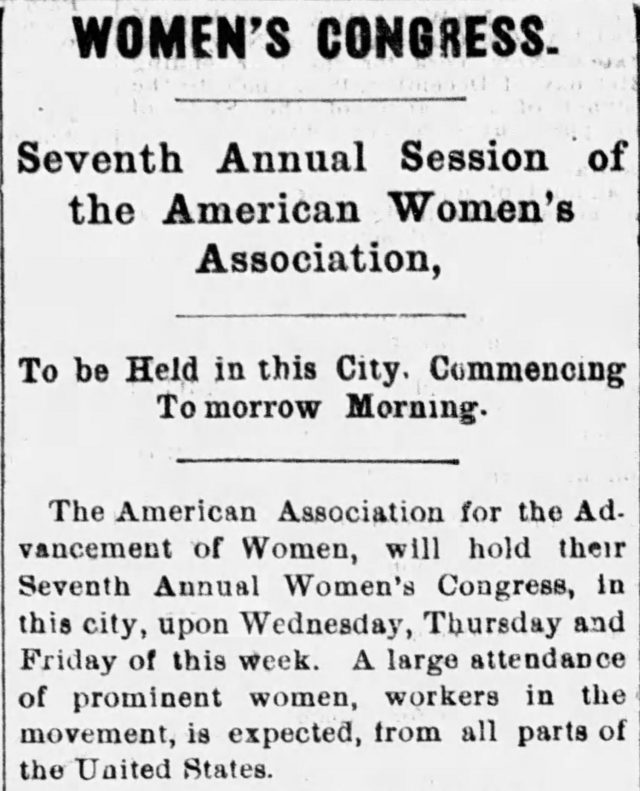“This congress ought to be attended by every intelligent woman in the state.”
Janesville Gazette, October 3, 1879
In October of 1879, less than six months before her death, Lavinia Goodell attended the American Women’s Association congress in Madison.

According to the Wisconsin State Journal:
The aim of the congress is to render women more helpful to each other, and more useful to society. It desires to bring together, in friendly counsel, women of diverse experience – the educator, the philanthropist, the house-keeper, the scientist – that from the little candle each has lighted at the daily altar, where her daily service has been offered, a flame may be kindled which shall send light into the dark corners, where, in spite of our boasted civilization, sin, misery and ignorance still lurk.
Lavinia was a vice-president of the American Women’s Association. Unlike the American Woman Suffrage Association, of which she was also an active member, the American Women’s Association did not advocate for suffrage. Indeed, the subject of suffrage was expressly excluded from the American Women’s Association’s discussions. Although Lavinia was a staunch suffrage advocate, her active participation in a woman’s organization that did not favor it indicates that she was eager to improve women’s lot in life however she could, and she had no qualms about joining forces with women who did not share all of her beliefs.
Lavinia wrote a notice of the Congress that appeared in the October 3, 1879 Janesville Gazette. She said it “ought to be attended by every intelligent woman in the State, who can consistently leave home. The best thought of the best women in the country, on a variety of subjects, will be presented.” The Milwaukee Sentinel said, “It will probably be a long time before so many able women from a distance will assemble in Wisconsin, and the Sentinel therefore feels like advising all who can, to attend the meetings.”
Lavinia was asked to present a paper at the Congress and, as always, she was meticulous in her preparation. Her chosen topic was penal legislation. An August 28 diary entry states that she wrote an outline of her remarks. On August 30 she wrote ten pages. On September 1 she reported, “Worked all day on my woman’s congress article, writing 18 pages up.” She finished the paper on September 2 and copied it on September 10.
Although the Congress did not start until October 7, Lavinia took the train to Madison the evening of Friday, October 3. On Saturday, October 4, her diary noted, “A pleasant day. Spent in Law Library and city library. … Also had pleasant interview with Judges Lyon and Orton (two of the Wisconsin supreme court justices who had voted to admit her to practice before that court in the summer) and saw Ryan (the Chief Justice who wrote the scathing 1876 opinion denying Lavinia’s petition to practice and who dissented to the 1879 opinion admitting her) whom suppose my presence made unhappy.”

On Sunday, October 5, Lavinia attended a service at the Congregational Church on West Washington Avenue and heard “a splendid sermon” preached by Pastor Charles H. Richards. She spent most of Monday, October 6 at the law library and called on I.C. Sloan, the attorney who had moved her admission to the Wisconsin Supreme Court. In the evening she went to tea and attended a literary club where she met a Tennessee judge and J.H. Carpenter, a well known Madison attorney. Tuesday, October 7 was spent arranging the programs for the Congress and attending a business meeting. The Congress itself and Lavinia’s penal legislation paper will be discussed in future posts. NK
Sources consulted: Wisconsin State Journal; Janesville Gazette; Milwaukee Sentinel; Lavinia Goodell’s diaries, August – October 1879.







